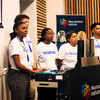Worldwatch
24 November 2003The merger between the University of Durban-Westville and the University of Natal is set to go ahead. As from January next year, the institution will be known as the University of KwaZulu-Natal. Minister of Education Kader Asmal selected the name put forward by the Joint Naming Committee earlier this year after the universities could not agree on a name. Asmal also announced that SABC chairperson Vincent Maphai would become chairperson of the interim council.
The Minister of Finance Trevor Manuel says Government will allocate R3-billion for the transformation of higher education next year. Tabling his Medium Term Budget Policy Statement (MTBPS) in parliament, Manuel said this amount would ensure rapid growth in workers and learners who benefited from skills programmes under the Sector Education and Training Authorities (SETAs). As part of the transformation of the higher education environment, the Minister of Education Kader Asmal last month announced chairpersons of interim councils for all merged institutions with effect from January 1, 2004. Manuel said the National Student Financial Aid Scheme (NSFAS) was producing "solid" financial results and had also ensured a promising future for financially needy students.
Kenya's six public universities were closed indefinitely last week after professors and lecturers went on strike to demand higher salaries and better terms of service. More than 3 200 academic staff members at Egerton, Kenyatta, Maseno, and Moi Universities, the University of Nairobi and Jomo Kenyatta University of Agriculture and Technology stayed away from classes and effectively paralysed learning. Lecturers also withdrew clinical and nursing services at two teaching hospitals. Amid fears of riots, violence and destruction of property by students outraged at the situation, the government decided to send the students home. The strikers are demanding new salary scales as well as research allowances, lighter teaching loads, opportunities to travel abroad for conferences and better office space. If these demands are met, they will become the highest-paid public workers in a country in which most people live in poverty.
In the US, the Sarah Lawrence College announced that it would no longer require applicants to submit standardised-test scores. Officials at the New York college said the decision had been based in part on changes to the Scholastic Assessment Test (SAT), specifically the new writing section of the test, that will be introduced in 2005. Most courses at the liberal-arts college require students to write papers and complete long-term projects. The college asks applicants to submit multiple essays in their applications as well as a graded writing sample. The new policy will take effect during the next American autumn.
The U.S. State Department is developing a plan to reintegrate former Iraqi weapons scientists into traditional academic institutions, where they could use their expertise to strengthen Iraq's universities and help develop the country. The plan would also provide incentives for top researchers to remain in Iraq, preventing a brain drain to countries that may be courting them.
A pathologist at the University of Oxford has been suspended without pay for two months, following an investigation into his refusal to consider an application from an Israeli student on the grounds that the applicant had served in the Israeli army. The university's vice-chancellor, Sir Colin Lucas, suspended the pathologist from academic duties on the recommendation of a disciplinary panel that investigated the incident. The board also recommended that the academic undergo training in offering equal opportunities.
Junior colleges in Japan are in a state of crisis, with enrolments plummeting to almost half of what they were just five years ago. Applications have plunged to 25% of what they were 10 years ago. So far only a handful of the country's 453 two-year institutions have closed, but 18 more are planning to shut down and many colleges are operating far below capacity, sometimes with fewer than 100 students.
Sources: Independent Online, AllAfrica.com, The Chronicle of Higher Education
 This work is licensed under a Creative Commons Attribution-NoDerivatives 4.0 International License.
This work is licensed under a Creative Commons Attribution-NoDerivatives 4.0 International License.
Please view the republishing articles page for more information.










